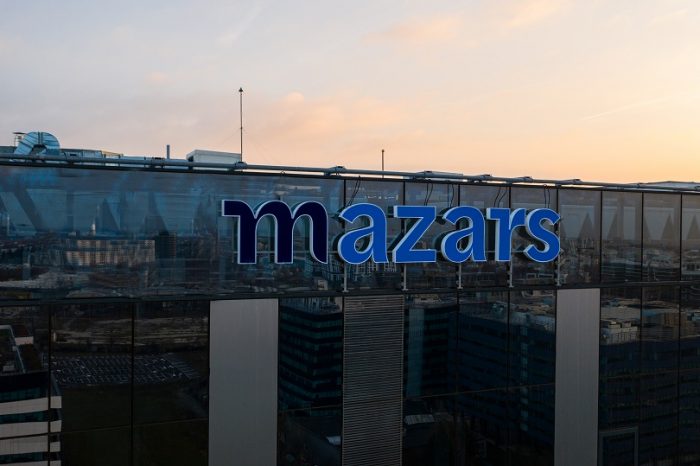Mazars: Changing the rules of the tech game through cybersecurity, transformative technologies, and the digitalisation of the business environment

The launch of the study „Are you missing the Tech Train? Global investment and implementation surrounding transformative technologies” by Mazars came as an opportunity to reveal the current level of implementation of today’s most significant five technologies: Artificial Intelligence (AI), Blockchain, Enterprise Resource Planning (ERP), Internet of Things (IoT) and Robotic Process Automation (RPA).
Sharing the vision of the 600 decision-makers from China, France, Germany, India, Great Britain, and the US on these innovative technologies, their attraction for investors, the implementation challenges they are facing and how those can be overcome – all these gain more relevance in the current situation created by the COVID-19 pandemic.
Teleworking brings technology to the attention of the management teams
Considering the current context, it is urgent and relevant to focus on topics that are equally complex and necessary, such as the need for security, the impact of technology on the business environment, the implementation of automation and streamlining of repetitive tasks, the existence of a business continuity plan given the current crisis. With the widening of teleworking, IT auditing becomes relevant in safeguarding IT networks against cyber-attacks, ensuring safe accessing of resources by users through multi-factor authentication and prevention of data loss and information leaks.
 „Technologies such as Artificial Intelligence, Blockchain, ERP, IoT, or RPA are increasingly proving their potential of enabling companies to cope with the new reality of the low touch economy. The three main benefits of these five technologies consist in the reduction of costs, transformation of the business model, and improving the quality of deliverables. To that extent, our study shows that the respondents associate certain technologies with specific benefits: 31% of the respondents say that RPA technology boosts their profitability, 26% say that Artificial Intelligence (AI) transforms their business model, while 28% of them think the ERP technology improves the quality of deliverables.”, mentioned Răzvan Butucaru, Partner, Financial Services & Advisory Leader, Mazars Romania.
„Technologies such as Artificial Intelligence, Blockchain, ERP, IoT, or RPA are increasingly proving their potential of enabling companies to cope with the new reality of the low touch economy. The three main benefits of these five technologies consist in the reduction of costs, transformation of the business model, and improving the quality of deliverables. To that extent, our study shows that the respondents associate certain technologies with specific benefits: 31% of the respondents say that RPA technology boosts their profitability, 26% say that Artificial Intelligence (AI) transforms their business model, while 28% of them think the ERP technology improves the quality of deliverables.”, mentioned Răzvan Butucaru, Partner, Financial Services & Advisory Leader, Mazars Romania.
The new context of teleworking brought to the companies’ attention the concept of an Agile enterprise. This philosophy is trying to create changes from the top, where the management team finds the right balance between standardizing processes and implementing risky innovations. Although this is most common within tech companies, more and more leaders are pursuing an Agile leadership manifesto as a competitive advantage on their market.
The IT security systems become a priority during the COVID-19 pandemic
It is worth mentioning that the companies’ need for security increases as cyber-attacks become more frequent. Their ever-growing impact – from damages to the hardware infrastructure, data, and information theft, to reputational damage resulting in loss of consumer and investor confidence – emphasize the importance of providing IT security for companies.
That is why all organizations must be aware that every technology comes with inherent risks, and the ability to manage those risks, with the help of cybersecurity measures, must complement the investments in adopting new technological solutions. According to security companies, out of the 1.2 million Internet domains with names linked to the pandemic or the COVID-19 semantic family created between 9 March and 19 April alone, more than 86,000 are included in the highest risk class. Most of these domains are of the malware and phishing type, and more than 56,000 are hosted by the four top cloud services providers: AWS, Azure, GCP, and Alibaba. This is the context in which cyber-attacks target the countries and industries most affected by the pandemic.
Digitization becomes a significant competitive advantage
 „It goes without saying that technology impacts the business environment, and as competitiveness increases at a global level, technology provides undisputable operational effectiveness. Beyond listing the attributes and benefits of technology, the most contrasting would be to think of a world totally deprived of it. How would the business environment look without IT systems that transfer, store, search, and retrieve information? A company without computers, networking, smartphones, servers/ cloud services, Internet, CRMs, ERPs, EDI systems (Electronic Data Interchange) for the electronic exchange of data between two or more partner companies is impossible to imagine nowadays.”, mentioned Horaţiu Nistor, Senior Manager, IT Audit & Advisory, Mazars Romania.
„It goes without saying that technology impacts the business environment, and as competitiveness increases at a global level, technology provides undisputable operational effectiveness. Beyond listing the attributes and benefits of technology, the most contrasting would be to think of a world totally deprived of it. How would the business environment look without IT systems that transfer, store, search, and retrieve information? A company without computers, networking, smartphones, servers/ cloud services, Internet, CRMs, ERPs, EDI systems (Electronic Data Interchange) for the electronic exchange of data between two or more partner companies is impossible to imagine nowadays.”, mentioned Horaţiu Nistor, Senior Manager, IT Audit & Advisory, Mazars Romania.
The basic operating infrastructure of a company is complemented by advanced technologies, such as the five technologies described within the Mazars study, as the company expands its operations, scales, and becomes mature. According to the study, 80% of the global decision-makers say that at least one of the five technologies will also impact their own companies. About Artificial intelligence, IoT, RPA, and ERP, 37% of respondents say it will significantly alter how they work, and 34% say the same about the blockchain technology. Moreover, 34% of executives say the ERP technology is already changing how companies operate, followed by IoT technology with 31%, of which executives share the same opinion. The COVID-19 crisis will fast-track the implementation of new systems based on these technologies, precisely for the benefits linked with their operation.
Implementing automation opens up the next level of productivity
Implementing automation is required as customer expectations increase and response times decrease, the level of load per employee increases, cost reduction, or reallocation of employees becomes a necessity due to the need to streamline repetitive tasks, and increasing productivity and ensuring competitive advantage is the desire of every decision-maker.
The results of the reference study are relevant, according to which 57% of respondents say they are investing 25% of the IT budget in various combinations of the five technologies. But not all technologies have the same interest. Therefore, another interesting aspect highlighted by the study is the correlation between the level of familiarity with a technology and the required level of investment in that particular technology. For instance, the low familiarity with Artificial Intelligence and the proportion of only 10% of the IT budget allocated for investments in this technology differs from the high level of familiarity with the IoT technology and the proportion of 26% of the IT budget allocated for investment in this technology.
A clear vision for the post-crisis future
The companies which were lagging on the digitization trail are now compelled to follow suit in a much more difficult economy. Even if the conditions are difficult, it is not too late for these companies, because the new technologies reshape entire industries, change hierarchies, and give rise to a new reality. Algorithms replace people, collect real-time information, and optimize offers, prices, services, and forecasts. Robots are increasingly interacting with people, and sensor networks pick up and send information to streamline internal resources and taking consumption experience to a new level externally.
















